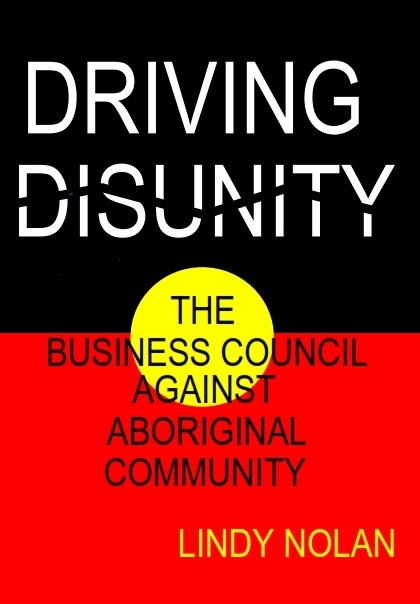Book Review: Driving Disunity by Lindy Nolan
Written by: on
New South Wales teacher and Teachers’ Federation activist Lindy Nolan has written a remarkable book on the agenda behind the Business Council of Australia’s (BCA) Indigenous involvement agenda.
There is no mystery about her view: the full title of her 101-page study is Driving Disunity – the Business Council Against Aboriginal Community.
The BCA is the peak body for the Chief Executives of the hundred-largest foreign and local corporations in Australia. Its members sponsor and promote a long list of initiatives under the heading of Indigenous Engagement, including the annual Garma Festival in the Northern Territory.
Nolan’s thesis is that this a deliberate change in approach to corporate attempts to exploit the human and physical resources of the roughly 25 per cent of the Australian land mass now under some form of control by Aboriginal and Torres Strait Islander Peoples.
It marks a change from when individual pastoral and mining companies confronted Aboriginal communities over issues like the Gurindji walk-off, the Nabalco Corporation’s fight against the Yolgnu People at Gove over the mining of bauxite, and oil explorer Amax’s fight with the Yungngora People at Noonkanbah in Western Australia. This approach was not good PR for the exploiters. In each dispute, growing numbers of non-Indigenous workers, working people and students rallied in support of Aboriginal and Torres Strait Islander Peoples.
Such disputes still occur, of course. However, the decisive sections of the ruling class, through the BCA, have openly sought to develop a “new architecture” for Aboriginal affairs, including high-profile, pro-business advocates within Aboriginal and Torres Strait Islander communities.
The reactionary Murdoch media has been complicit in this new approach by publishing and publicising a group of Aboriginal leaders who hold Aboriginal and Torres Strait Islander communities largely responsible for the social problems of unemployment, substance abuse and domestic violence, who support income control and other punitive approaches, who disparage Land Rights and self-determination in favour of assimilation into the capitalist economy.
“Business Council of Australia member companies are helping to create the social and economic conditions in which Aboriginal and Torres Strait Islander people can prosper and thrive,” says the BCA on its website.
Nolan takes the BCA to task, saying, through a number of case studies, that its policies and practices have damaged Aboriginal communities and seen them lose control over their lands. This is not mere assertion: it is a conclusion drawn from meticulous and detailed research into the BCA and the outcomes arising from the application to several Aboriginal communities of its profit-driven policies.
Nolan also contextualises the racist NT Intervention within BCA and other right-wing attempts to roll back land rights in the NT and open Aboriginal lands to commercial exploitation. She shows how the BCA has driven the Reconciliation movement and its offshoot, the move for Constitutional Recognition. She also amplifies the counter case put by grassroots Aboriginal Peoples for Treaty embodying sovereignty.
This is a ground-breaking study of corporate Australia’s creation of new weapons in their fight to dispossess Aboriginal and Torres Strait Islanders of their birthright. Sadly, certain Aboriginal leaders have put themselves at the service of the most powerful core of the ruling class, in the forlorn hope it will solve the horrific problems First Nations Peoples.
It is an essential resource for Indigenous and non-Indigenous peoples determined to work together for a just settlement of their mutual relationship. The essence of that settlement was expressed in 1975 by E.F. Hill, founding Chairperson of our Party, when he wrote:
“The black people have resisted and still resist in various ways, the imperialist occupation of Australia. They form an important component of the independence movement in Australia. There can be no independence for Australia without the independence of the black people.”
Nolan’s book, published by the Spirit of Eureka, can be ordered online at: http://www.spiritofeureka.org/index.php/shop
Print Version - new window Email article
-----
Go back
Independence from Imperialism
People's Rights & Liberties
Community and Environment
Marxism Today
International
Articles
| Sydney’s anti-Herzog rally – snipers, a police riot, and defiance |
| No Pride in an Ongoing Genocide |
| Adelaide Writers’ Week near collapse as authors stand with Dr Randa Abdel-Fattah |
| When we fight back, let’s stand on solid ground |
| Don’t let responses to Bondi silence our voices! |
| Dangers in multinational corporations’ drive to establish Space-based data centres |
| Criminalising Lenin - Putin’s attempts to stifle dissent |
| Wage-theft: an Australian standard business practice |
| The Whitlam Dismissal: America's coup for the control of Australia |
| Party booklet on Whitlam dismissal released |
| CPA (M-L) paper on fascism in Australia |
| Let the ruling classes tremble at the sight of the fighting Filipino masses |
| Labor law used to intimidate and harass opponents of genocide |
| Book Review: The New Age of Sexism |
| Violent Nazi attack on Camp Sovereignty should be investigated as a hate crime |
| Let Palestinians decide! |
| We stand with Mary! |
| Israel illegally boards Freedom Flotilla Boat: Albanese must protect Australians involved |
| New Freedom Flotilla heads for Gaza as massacres increase. |
| Terrorism? Where do we stand? |
-----

